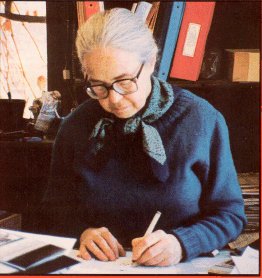Adé Béthune (1914-2002)

I had the privilege of being apprenticed to Adé Béthune in the early 1970s. We remained good friends until her death. Adé was a person of total integrity, a Catholic steeped in the grand liturgical and spiritual traditions of the old world, a sage with the heart of a child, a friend of the poor, an organic gardener, a master artist, a Benedictine Oblate of Portsmouth Abbey.
In the 1940s Adé founded the Saint Leo League in Newport, Rhode Island to educate clergy and layfolk by making good liturgical art available to them. The monthly meetings of the Saint Leo League continued to draw friends of Adé and friends of the liturgy from all over New England well into the 1980s. Father Giles Dimock, O.P. often celebrated Holy Mass for the group. Adé was editor of the review Sacred Signs; its articles are as timely today as when they were written more than thirty years ago.
Adé did a lot for me. She helped me grow up. She introduced me to the beauty and rightness of compost heaps and of the conical chasuble! She corrected my calligraphy and encouraged by attempts at “making good pictures.” She shared my passion for Gregorian chant, calling it “plainchant for plain folk.” She defended the traditional square notation on a four line staff, explaining that its “pictographic” quality made it easier to read than modern notation. At my First Solemn Mass twenty four years ago, Adé served as lector.
One of the best impressions of Adé is this one, written by her friend Dorothy Day, foundress of The Catholic Worker:
Whenever I visited Ade I came away with a renewed zest for life. She has such a sense of the sacramentality of life, the goodness of things, a sense that is translated in all her works whether it was illustrating a missal, making stained-glass windows or sewing, cooking or gardening. To do things perfectly was always her aim. Another first principle she always taught was to aim high. “If you are going to put a cross bar on an H,” she said, “you have to aim higher than your sense of sight tells you.”
Dorothy Day. The Long Loneliness . New York: Harper & Brothers, 1952. p.190-1.

Dear Father Mark,
I thought you and the readers of Vultus Christi might appreciate the following story:
I grew up at Portsmouth Abbey School, as my father is a math teacher there. Although I am too young to have any clear personal memories of Adé herself, her artwork has made an impact on my life, especially since my family prepares for Christmas each year by using an Advent calendar that was designed by Adé and made by my mother. However, this story is not about me, but rather about Adé, Diane (my youngest sister), and God:
One evening, shortly before Adé died, Fr. Caedmon Holmes was at our house for a weekly Bible Study meeting. My mother told him that whenever she held 4-month-old Diane facing away from her, Diane was fussy, but the minute my mother turned her around, she grew calm once more, since she could look up at my mother’s face again. The next time he went to visit Adé, Fr. Caedmon told her this story, and her reaction was, “Yes…to see the Face…” And then, within a day or two, Adé departed this world to gaze on the beauty of God’s Face.
Truly, Adé did retain her “sense of the sacramentality of life” until the last minute of her life on earth!